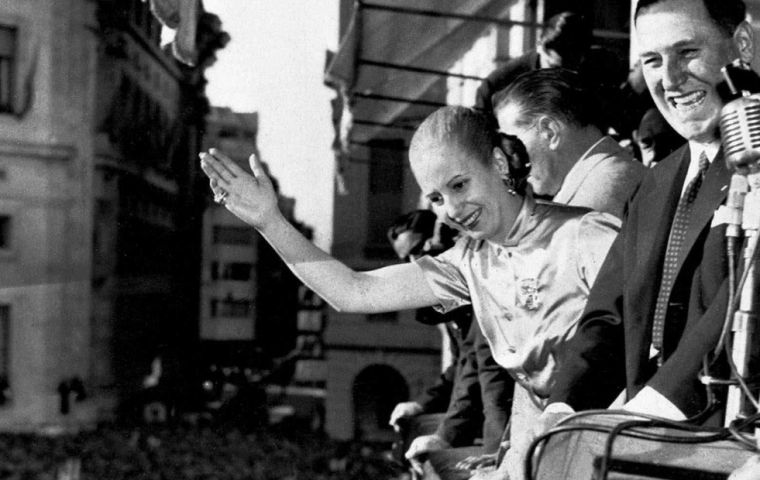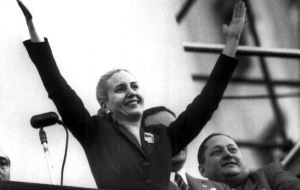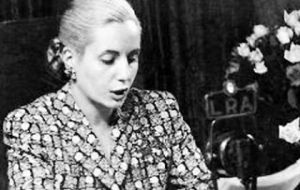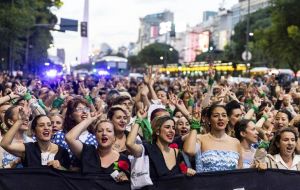MercoPress. South Atlantic News Agency
The “Spiritual Leader of the Argentine Nation” was born a century ago
 Argentina's First Lady in one of her latest appearances from the Casa Rosada balcony
Argentina's First Lady in one of her latest appearances from the Casa Rosada balcony  Maria Eva Duarte de Perón, before she died of cancer at age 33.
Maria Eva Duarte de Perón, before she died of cancer at age 33.  Evita the broadcaster and actress
Evita the broadcaster and actress  Argentine women march in Buenos Aires dressed as Evita Peron to honor her memory and achievements
Argentine women march in Buenos Aires dressed as Evita Peron to honor her memory and achievements She was probably the most influential woman in recent South American history, who in her brief life changed the political culture of Argentina: she was adored by the poor and the workers, she empowered women and helped her husband, as First Lady, build a formidable catch-all movement that has since dominated Argentine politics. All this in such a short period of time, less than a decade, has turned Evita Peron into a myth.
Maria Eva Duarte was born a century ago, 7 May 1919, in Los Toldos, Argentina. She grew up poor, dreaming of becoming actress. Eva and her sister, Erminda, often made up little performances together in their youth. Her mother, Juana Ibaguren, had four children with her father, Juan Duarte. While the couple never married, Juana used the last name Duarte for herself and the children.
Juan Duarte had another family with his wife. And when he died in a car accident in 1926, his wife shunned Juana and her family at the funeral, according to some reports. Already struggling financially, the loss of her father meant greater hardships for the family. Her oldest siblings, Juan and Elisa, worked to help out. The family moved to Junín, a city in the province of Buenos Aires, in 1930. There, another sister, Blanca, became a teacher. The mother also took in boarders, cooked and worked as a seamstress.
Around the age of 15, Eva Duarte moved to Buenos Aires to become an actress. There, she found work with a number of theater companies. In 1937, she landed her first film role in Segundos Afuera and got a contract to perform on the radio. She continued to work in stage productions as well over the next few years.
Eva was about 20 years old when she started her own entertainment business, the Company of the Theater of the Air, which produced radio programs. In 1943, she enjoyed one of her greatest successes: Eva signed on to portray a number of famous women in history on a special radio series, giving her the chance to play the likes of Queen Elizabeth I and Catherine the Great.
And then Eva's life changed dramatically when she met and later married Juan Perón, a colonel and government official, in 1945. He became president of Argentina the following year, and his wife proved to be a powerful political influence. Evita Peron appealed to the working class by telling the crowds “I am one of you. I know what it is to go hungry.” An experienced actress, she invented her own myth and performed the role of politician's wife.
Evita Perón used her position as first lady to fight for causes she believed in, including women's suffrage and improving the lives of the poor. She also unofficially ran the ministries of health and labor in her husband's government. After cutting off government subsidies to the traditional Sociedad de Beneficencia (“Aid Society”), thereby making more enemies among the traditional elite, she replaced it with her own Eva Peron Foundation, which was supported by “voluntary” union and business contributions plus a substantial cut of the national lottery and other funds.
These resources were used to establish thousands of hospitals, schools, orphanages, homes for the aged, and other charitable institutions. Evita was largely responsible for the passage of the woman suffrage law and formed the Peronista Feminist Party in 1949. She also introduced compulsory religious education into all Argentine schools.
By then Evita Perón became a legendary figure in Argentine politics. A skilled speaker, she was adored by the poor citizens she worked hard to help, but she was not without critics and detractors. Asked to run as vice president with her husband in 1951, she faced opposition by the army. Evita ultimately turned down the post—possibly due to the health issues she was battling around this same time, stemming from cervical cancer.
Evita made her last public appearance in June 1952, at her husband's second inauguration. The following month, she succumbed to her illness: Evita died of cervical cancer in Buenos Aires on July 26, 1952. The Spiritual Leader of the Nation was given a funeral fit for a head of state, showing how much public support she had from the Argentine people at the time.
After her death in 1952, Evita remained a formidable influence in Argentine politics. Her working-class followers tried unsuccessfully to have her canonized, and her enemies, in an effort to exorcise her as a national symbol of Peronism, stole her embalmed body in 1955, after Juan Perón was overthrown, and secreted it in Italy for 16 years.
In 1971 the military government, bowing to Peronist demands, turned over her remains to her exiled widower in Madrid. After Juan Perón died in office in 1974, his third wife, Isabel Peron, hoping to gain favor among the populace, repatriated the remains and installed them next to the deceased leader in a crypt in the presidential palace. Two years later a new military junta hostile to Peronism removed the bodies. Eva’s remains were finally interred in the Duarte family crypt in Recoleta Cemetery in Buenos Aires, where it has become a tourist attraction and regularly revered by her followers.
But also since her death, Evita's life continues to fascinate people around the world. The story of a poor girl who became a prominent political power has been the subject of countless books, films and plays.




Top Comments
Disclaimer & comment rules-

-

-

Read all commentsI was a primary school kid during her years in power. People lived in fear of her because at any moment she would send her goons around or “nationalize” things. There were innumerable stories of her corruption and abuse of power. My father worked in a company that was a leading producer of cooking oil. One time her foundation put in an truly immense order for oil, over half of the company's annual production, with price and payments conditions specified. When the last delivery was made the company got a letter from her thanking it for the donation. That was sort of typical. Grown-ups all seemed to agree that what drove her was not social injustice, it was revenge for her poverty when she was young and the way she was rejected by the “upper class society” when she became the president's wife. O, our obligatory reading book when I was either in fourth or fifth grade was her “biography,” “La Razón de my vida.”
May 07th, 2019 - 02:08 pm +4100% fascism.....
May 07th, 2019 - 12:00 pm +3Just a couple of weeks ago there were very critical comments on this site about the British Embassy in Buenos Aires celebrating the Queen's birthday. I'm not sure that “Queen Evita” is in quite the same league as Elizabeth II !!
May 07th, 2019 - 01:56 pm +3Commenting for this story is now closed.
If you have a Facebook account, become a fan and comment on our Facebook Page!